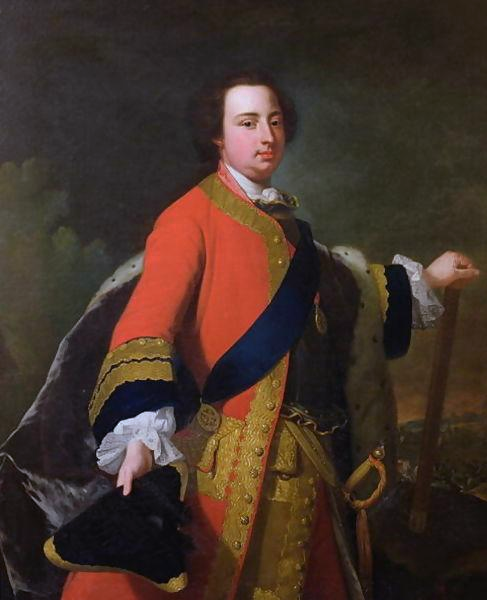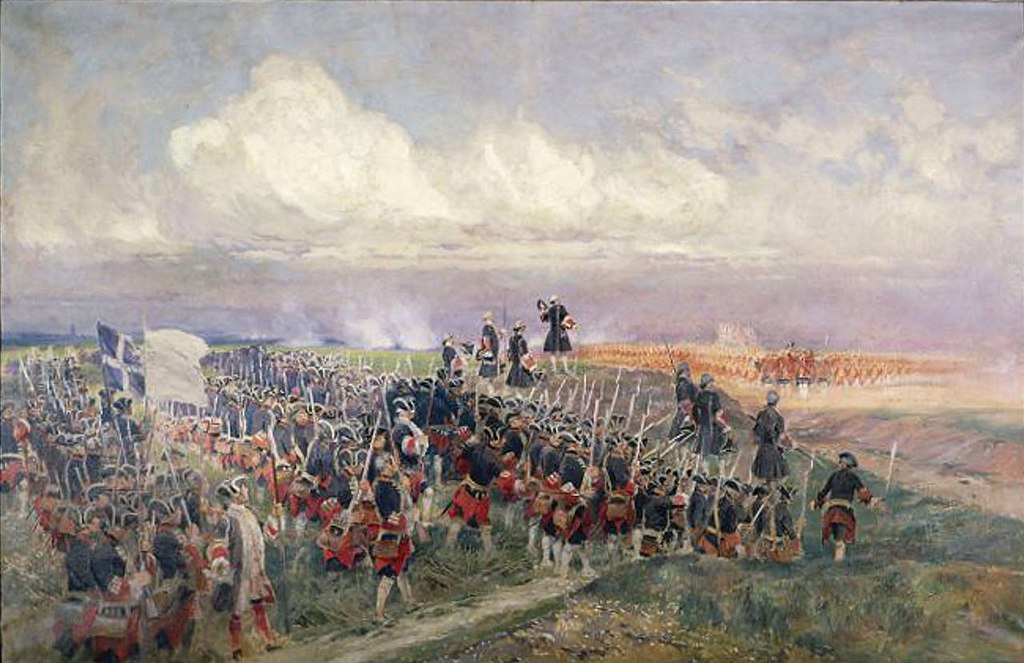by Susan Flantzer © Unofficial Royalty 2016

Prince William Augustus, Duke of Cumberland; Credit – Wikipedia
Fans of Diana Gabaldon‘s novels of The Outlander series and the television series of the same name know that the Battle of Culloden in 1746 resulted in a decisive defeat of the Jacobite forces that wanted to restore the heirs of Roman Catholic Stuart King James II of England/ VII of Scotland to the throne. Prince William Augustus, Duke of Cumberland was the British troops commander at the Battle of Culloden and is known by the nicknames “The Butcher of Culloden” and “Butcher Cumberland.”
Prince William Augustus was born at Leicester House in London, England on April 26, 1721. He was the second son and the fifth of the eight children of King George II of Great Britain and Caroline of Ansbach who were the Prince and Princess of Wales at the time of his birth. His paternal grandfather King George I was the current British monarch. Specific christening information is unknown, but it seems his godparents were his paternal aunt Sophia Dorothea and her husband Friedrich Wilhelm I, King in Prussia.
William Augustus had seven siblings:
- Frederick, Prince of Wales (1707 – 1751), married Princess Augusta of Saxe-Gotha, had issue, including King George III
- Anne, Princess Royal (1709 – 1759), married Willem IV, Prince of Orange, had issue
- Princess Amelia (1711 – 1786), unmarried
- Princess Caroline (1713 – 1757), unmarried
- Prince George William (1717 – 1718), died in infancy
- Princess Mary (1723 – 1772), married Friedrich II, Landgrave of Hesse-Kassel, had issue
- Princess Louise (1724 -1751), married Frederik V, King of Denmark and Norway

George II and his family; Credit – Wikipedia
In 1725, at the age of four, William Augustus was created Knight Companion of the Order of the Bath, and the following year he was created Duke of Cumberland, Marquess of Berkhamstead, Earl of Kennington, Viscount Trematon, and Baron of Alderney. William Augustus’ mother Caroline of Ansbach had many scientific and artistic interests. She corresponded with several intellectuals including mathematician Gottfried Leibniz, whom she had met when she was a child, and Christian Thomasius, German jurist and philosopher. Caroline supported French philosopher Voltaire during his exile in England from 1726-1729 and was also considered one of the greatest promoters of the composer George Frideric Handel, who had come to England with King George I. Caroline made sure her son was well educated by appointing Astronomer Royal Edmund Halley and antiquarian, art collector and amateur architect Sir Andrew Fountaine as William Augustus’ tutors.

William Augustus, Duke of Cumberland by Charles Jervas, oil on canvas, circa 1728, NPG 802 © National Portrait Gallery, London
William Augustus was intended to eventually become Lord High Admiral of the Royal Navy. However, he became dissatisfied with the Royal Navy and pursued a career in the Royal Army instead. His first post, in 1741, was as Colonel of the First Regiment of Foot Guards. In 1742, William Augustus became a Major General. He accompanied his father King George II, the last British monarch to personally lead troops in a battle, at the Battle of Dettingen (June 27, 1743) during the War of the Austrian Succession, where he was wounded in action. In 1745, he received the command of the Pragmatic Allies, comprising mainly Dutch, British, and Hanoverian troops, at the Battle of Fontenoy. His decision to launch a frontal assault against a larger French army caused a terrible defeat with heavy casualties.

The Battle of Fontenoy, William Augustus’ first battle as commander by Édouard Detaille; Credit – Wikipedia
William Augustus led the British forces against the Jacobite Rising of 1745-1746 led by the Catholic pretender Charles Edward Stuart (Bonnie Prince Charlie), grandson of the deposed King James II. The exhausted Jacobite forces consisted of about 5,000 men while the British forces numbered 9,000 well-trained troops. On April 16, 1746, near Inverness, Scotland, the superior British forces needed just 25 minutes to defeat the Jacobite forces in the Battle of Culloden. Between 1,500 and 2,000 Jacobites were killed or wounded while the British losses were much lighter, with 50 dead and 259 wounded. William Augustus’ severity and brutality in pursuing the Jacobites after the battle earned him the nicknames “The Butcher of Culloden” and “Butcher Cumberland.” He ordered his troops to go through the battlefield and stab to death any wounded Jacobite troops and non-combatants. Towns suspected to be rebellious were burned and the livestock was confiscated. The captured Jacobites were hanged. Men and women suspected of being Jacobite sympathizers were arrested and shipped to London for trial. The conditions on the ships were horrible and many died en route. In Great Britain, William Augustus was nicknamed “Sweet William” by his Whig supporters and “The Butcher” by his Tory opponents. In Scotland, his name is still infamous. After the Battle of Culloden, there were no further Jacobite uprisings.

The Battle of Culloden by David Morier, 1746; Credit – Wikipedia
In 1757, during the Seven Years’ War, William Augusts and his forces from his father’s Electorate of Hanover had retreated to the fortified town of Stade (Germany) on the North Sea coast. King George II gave him discretionary powers to negotiate a separate peace with France. The Convention of Klosterzeven led to Hanover’s withdrawal from the war and partial occupation by French forces with 38,000 Hanoverian forces laying down their arms. King George II considered this so humiliating that William Augustus was forced to resign his military commands and retire from the army.

William Augustus, Duke of Cumberland, studio of Sir Joshua Reynolds, oil on canvas, circa 1758-1760, NPG 625 © National Portrait Gallery, London
William Augustus never married and his final years were lived out under the reign of his nephew King George III. He grew quite fat and suffered a series of strokes before dying at the age of 44 at his London home in Upper Grosvenor Street on October 31, 1765. He was buried at Westminster Abbey in the Henry VII Chapel.
This article is the intellectual property of Unofficial Royalty and is NOT TO BE COPIED, EDITED, OR POSTED IN ANY FORM ON ANOTHER WEBSITE under any circumstances. It is permissible to use a link that directs to Unofficial Royalty.
Works Cited
Abrufstatistik. “William Augustus, Duke of Cumberland.” Wikipedia. N.p.: Wikimedia Foundation, n.d. Web. 24 Sept. 2016.
“Battle of Culloden.” Wikipedia. N.p.: Wikimedia Foundation, 24 Sept. 2016. Web. 24 Sept. 2016.
“Prince William, Duke of Cumberland.” Wikipedia. N.p.: Wikimedia Foundation, 18 Aug. 2016. Web. 24 Sept. 2016.
Susan. “Caroline of Ansbach, Queen of Great Britain.” British Royals. Unofficial Royalty, 23 Dec. 2015. Web. 24 Sept. 2016.
Williamson, David. Brewer’s British Royalty. London: Cassell, 1996. Print.
